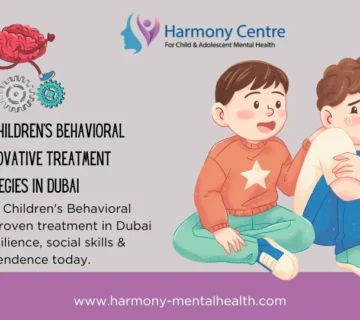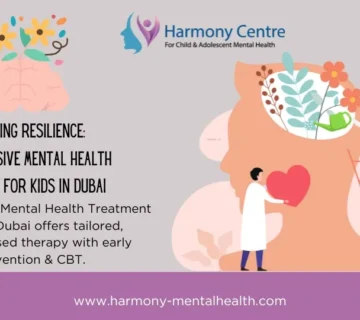Child Eating Disorder Dubai: Understanding, Identifying, and Overcoming Challenges
Explore child eating disorder in Dubai. Learn how eating disorders affect children and teens, recognize early warning signs, and discover effective counseling and medical support options at Harmony Centre.
Contact Information
| Contact Method | Details |
|---|---|
| Phone | +971 (52) 8773268 / 04 558 2015 |
| Click Here | |
| info@harmony-mentalhealth.com | |
| Address | Office 409, Building Alrazi-64C, 26th St, Healthcare City, Dubai |
Introduction: The Impact of Eating Disorders on Young Lives
In Dubai’s fast‑paced urban environment, children and adolescents face unique pressures that can sometimes manifest as eating disorders. Conditions such as anorexia, bulimia, and other disordered eating behaviors affect not only physical health but also emotional and social well‑being. The challenges are complex—academic stress, cultural expectations, and digital influences can all play a role in the development of these disorders.
At Harmony Centre, we understand that early detection and a comprehensive, individualized treatment plan are crucial. Our integrated approach combines medical, nutritional, and psychological support to help young people overcome these challenges and build a healthier future.
Understanding Child Eating Disorders
Child eating disorders refer to a range of abnormal eating behaviors that can include severe restrictions in food intake, More eating, purging behaviors, or an unhealthy preoccupation with body weight and image. These conditions may manifest as:
- Anorexia Nervosa:
Characterized by significant weight loss, an intense fear of gaining weight, and a distorted perception of body size. Children with anorexia may refuse to eat even when underweight. - Bulimia Nervosa:
Involves episodes of eating followed by compensatory behaviors such as self‑induced vomiting or excessive exercise. Although less common in children, early signs can appear during adolescence. - Other Disordered Eating Behaviors:
These may include chronic dieting, excessive concern about body shape, or irregular eating patterns that do not meet the full diagnostic criteria of anorexia or bulimia but still adversely affect health.
Understanding these disorders is the first step toward effective intervention. When left unaddressed, eating disorders can lead to severe physical, emotional, and developmental issues.
Contributing Factors in Dubai
Several factors unique to Dubai’s dynamic environment can contribute to the development of eating disorders in children and teens:
Academic and Social Pressures:
Dubai’s educational system is known for its high standards and competitive spirit. The pressure to excel academically, combined with the desire to fit in socially, can create a stressful environment where disordered eating behaviors may emerge as a coping mechanism.
Cultural and Media Influences:
In a multicultural city like Dubai, children are exposed to a variety of cultural ideals and beauty standards. Media portrayals of thinness and perfection can distort body image and lead to unhealthy eating habits.
Digital Overload and Social Media:
With constant exposure to social media, children may compare themselves unfavorably to others. This digital influence can lead to an unhealthy preoccupation with body image and trigger disordered eating patterns.
Family Dynamics and Transitions:
Changes within the family, such as divorce, relocation, or conflicts, can significantly impact a child’s emotional state. Inconsistent or stressful home environments can contribute to the development of eating disorders as children seek control in other areas of their lives.
Environmental Stressors:
The fast pace of urban life in Dubai, along with high living costs and the pressure to succeed, can create a constant state of stress that exacerbates mental health challenges, including eating disorders.
At Harmony Centre, we recognize that these contributing factors require a nuanced, culturally sensitive approach. Our team carefully considers the unique challenges faced by children in Dubai when designing personalized treatment plans.
Treatment Approaches at Harmony Centre
At Harmony Centre, our approach to treating child eating disorders is comprehensive and integrated. We believe that addressing these conditions requires a combination of medical, nutritional, and psychological interventions, tailored to each child’s needs.
Multidisciplinary Assessments:
Our process begins with a thorough evaluation involving pediatricians, psychologists, nutritionists, and other specialists. These assessments help us understand the severity of the disorder, identify any co‑occurring conditions, and develop a customized treatment plan.
Nutritional Counseling and Medical Support:
A balanced, nutritious diet is critical for recovery. Our nutritionists work closely with children and their families to create meal plans that ensure healthy weight gain or maintenance, as needed. Medical monitoring is provided to track progress and address any physical complications arising from the disorder.
Psychological Counseling:
We use evidence‑based therapies such as Cognitive Behavioral Therapy (CBT) to help children identify and change negative thought patterns related to food and body image. Play therapy and art therapy are also used, especially for younger children, to help them express their emotions in a non‑threatening way.
Family Therapy and Parental Guidance:
Family dynamics play a crucial role in the recovery process. Our family therapy sessions focus on improving communication, resolving conflicts, and creating a supportive home environment. Parental guidance workshops equip parents with strategies to help reinforce healthy eating habits and address the emotional needs of their child.
Mindfulness and Stress Reduction Techniques:
Stress and anxiety can trigger or worsen disordered eating behaviors. We incorporate mindfulness practices—such as deep breathing, guided meditation, and yoga—to help children manage stress and cultivate a positive relationship with food.
Integration of Educational Support:
For school‑aged children, we collaborate with educators to ensure that learning environments are supportive. Adjustments in the classroom and the development of Individualized Education Plans (IEPs) can help reduce academic stress, which is often a contributing factor to eating disorders.
The Harmony Centre Difference
Harmony Centre is recognized as the best option for child eating disorder treatment in Dubai. Our reputation is built on a foundation of integrated, compassionate care and a deep commitment to every child’s well‑being.
Personalized Care:
Every child is unique, and so is our approach. We tailor our interventions based on comprehensive assessments, ensuring that each treatment plan addresses the specific needs and challenges of the child.
Experienced, Multidisciplinary Team:
Our team comprises experts in pediatric medicine, psychology, nutrition, and therapy. This collaborative approach enables us to provide comprehensive care that covers every aspect of a child’s recovery—from physical health to emotional resilience.
Culturally Sensitive Treatment:
Understanding Dubai’s diverse cultural landscape is essential. Our services are designed to be culturally sensitive, ensuring that language preferences, family values, and social norms are respected throughout the treatment process.
Continuous Support:
Recovery from an eating disorder is a journey, not a one-time event. We provide ongoing monitoring, follow‑up sessions, and telehealth services to ensure that our support remains effective as the child grows and their needs evolve.
Proven Outcomes:
Families who choose Harmony Centre consistently report improvements in their child’s physical health, emotional well‑being, and overall quality of life. Our data‑driven approach and commitment to excellence have made us a trusted leader in the field.
Practical Strategies for Families
Supporting a child with an eating disorder at home is a critical component of the recovery process. Here are some practical strategies for parents and caregivers:
Create a Structured Environment:
Establish a daily routine that includes regular meal times, designated periods for homework and play, and consistent sleep schedules. Visual aids such as charts or calendars can help reinforce routines and provide a sense of stability.
Promote Positive Food Experiences:
Encourage a relaxed and enjoyable mealtime atmosphere. Avoid pressuring the child to eat; instead, offer a variety of nutritious foods in a non‑judgmental setting. Involve the child in meal planning and preparation to foster a positive relationship with food.
Encourage Open Communication:
Create opportunities for your child to talk about their feelings and experiences. Listen actively and validate their emotions, which can help reduce the isolation often associated with eating disorders.
Incorporate Mindfulness Practices:
Teach your child simple mindfulness techniques such as deep breathing or guided visualization. These practices can help manage stress and create a calming pre‑meal routine that reduces anxiety around eating.
Engage in Family Activities:
Participate in activities that promote bonding and reinforce healthy behaviors. Family walks, art projects, or cooking together can improve communication and create positive associations with mealtime and daily routines.
Collaborate with Educators and Therapists:
Maintain regular communication with your child’s teachers and therapists to ensure that strategies are consistently applied across home and school. This collaboration is key to reinforcing the progress made in therapy.
FAQs About Child Eating Disorder Dubai
Book a Consultation Now
Final Thoughts: A Pathway to Recovery and Resilience
Child eating disorders are complex conditions that require a thoughtful, integrated approach. In Dubai’s dynamic environment, where children face various pressures, early and comprehensive intervention is crucial. Harmony Centre offers the best option for addressing these challenges through our personalized, multidisciplinary approach.
Our evidence‑based strategies are designed not only to treat the symptoms of eating disorders but also to address the underlying emotional and behavioral issues. By combining nutritional counseling, therapeutic interventions, and family support, we create a robust support system that empowers children to overcome their struggles and build a brighter future.
Parents play a key role in the recovery process. With the right tools and guidance, they can help create a home environment that fosters healthy eating habits, positive self‑image, and emotional resilience. When families, schools, and mental health professionals work together, the path to recovery becomes clearer and more achievable.
Investing in your child’s mental health is an investment in their future. With the comprehensive support provided by Harmony Centre, children can develop the skills they need to manage stress, overcome challenges, and thrive academically and socially. Our commitment to excellence and personalized care makes us the ideal partner in this journey.
Embrace the pathway to recovery and resilience—because every child deserves the opportunity to heal, grow, and flourish.
👉 Book a Consultation Now: Call +971 4 558 2015 or visit www.harmony-mentalhealth.com.
Join our online community and stay updated with our latest events, articles about Child Eating Disorder Dubai



